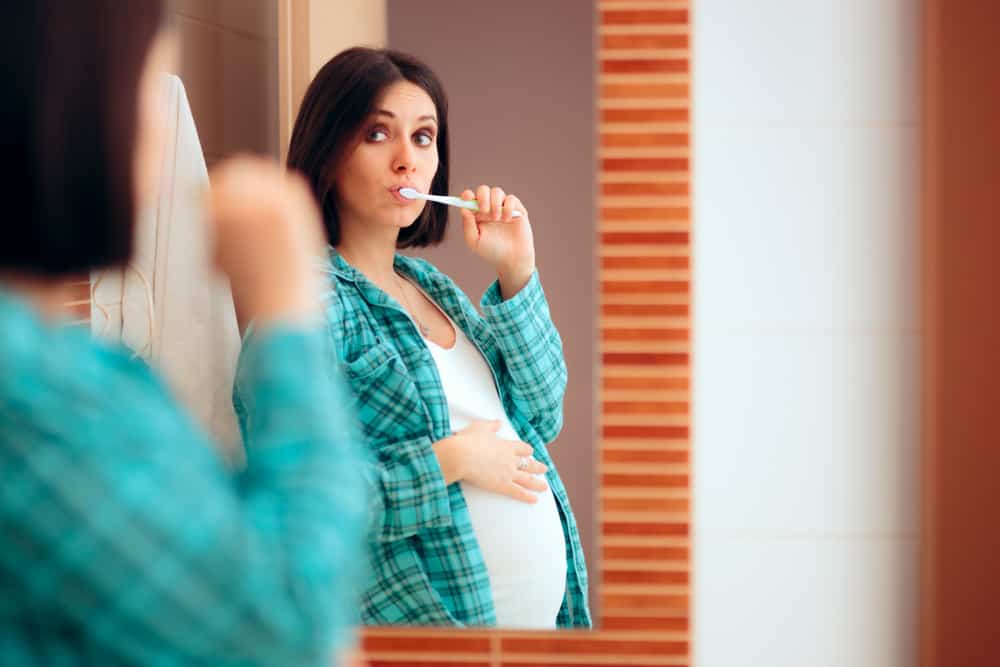One of the strangest symptoms that new mothers may experience during pregnancy is bad breath, also known as halitosis. In most situations, the bad breath isn’t associated with any other symptoms; however, it can be a major turn off. Some pregnant women may feel embarrassed about the situation and uncomfortable when talking with other people. They may feel like it’s a big deal, but it isn’t—with a few basic dietary and dental hygiene habit changes, anyone can have fresh breath, pregnant or not.
In this guide, we’ll look at some of the most common causes (and some solutions) for bad breath during pregnancy. Though bad breath can be caused by pregnancy hormones and other changes that occur at this time, this symptom of pregnancy doesn’t have to last.
Causes and Cures for Bad Breath During Pregnancy
There are a whole host of reasons why some pregnant women can experience bad breath during pregnancy. It may be due to hormonal changes or due to other reasons, like calcium deficiencies or even morning sickness. Identifying the underlying cause behind one’s bad breath can help pregnant women to find a solution that works.
It can be difficult to narrow down the underlying cause at first. Those who struggle with bad breath may want to try out different solutions to see whether they help with easing or eliminating bad breath during pregnancy. Let’s look at some of the most common causes below.
Hormonal Changes and Morning Sickness
Pregnancy comes with hormonal changes, especially in estrogen and progesterone levels. In fact, changes in estrogen and progesterone levels can increase levels of plaque and increase the risk of gingivitis.
Approximately 80% of pregnant women will experience morning sickness. Vomiting is a common symptom of morning sickness, and no one’s breath smells good if they’ve been vomiting frequently. The acidic environment also encourages further bacterial growth. Although it’s coined ‘morning sickness’, symptoms of this condition can appear at any time during the day or night.
Solution: Practice Good Dental Hygiene
There’s not much that pregnant women can do about hormonal changes or morning sickness. It’s natural for the body to go through hormonal changes when pregnant. The only thing that can be done is to practice good dental hygiene. This includes brushing and flossing every day and in between meals. Those who brush and floss more frequently will usually find that their bad breath will go away or become much less noticeable.
Some pregnant women have suggested eating ginger to combat morning sickness. There’s no harm in trying this solution out.
Calcium Deficiency
Pregnant women often struggle with hypocalcemia, which is a deficiency in calcium, if they do not get enough calcium in their diet. Experts recommend getting at least 1,000 mg of calcium a day during pregnancy because the baby in the womb will absorb some calcium from the mother’s body. Mothers who are breastfeeding will also need more calcium, as they lose about 3% to 5% of their bone mass from calcium loss to breastmilk.
Pregnant mothers who are not getting enough calcium are also more prone to cavities and decayed teeth on top of halitosis. Poor dental hygiene can be a hassle during pregnancy and can lead to unnecessary stress.
Solution: Increase Calcium Intake

Pregnant women have to make a lot of lifestyle changes. There are a lot of activities and foods that they can no longer enjoy. They also need to be very careful with their meals to ensure that they’re eating a nutritious diet that contains a lot of calcium.
Some food items naturally have a lot of calcium while others have calcium added in them, like calcium-fortified cereal. It’s important to check food labels when planning out your meals. With that said, there are some foods that pregnant women should try to incorporate into their meals, as they contain a lot of calcium. They include:
- Beans
- Cheese
- Leafy greens
- Lentils
- Milk
- Nuts
- Salmon
Pregnant mothers who are worried that their diet doesn’t contain enough calcium should consider taking calcium supplements: calcium carbonate or calcium citrate.
Calcium citrate is a great option for those who can’t stomach a lot of food and plan on taking the supplements on an empty stomach. Calcium carbonate, however, is less expensive and works best when taken with food.
Dehydration
Many women will often find that they need to urinate more often at around 6 to 8 weeks of pregnancy. Excessive urination coupled with vomiting can lead to dehydration, which can lead to dry mouth. A decrease in saliva can greatly exacerbate bad breath. Saliva is necessary for flushing bacteria and leftover food particles from one’s mouth. Without as much saliva present, bacteria and debris won’t be removed as efficiently.
Solution: Stay Hydrated

Make sure to drink plenty of fluids to compensate for the decrease in saliva. Drink a glass of water when you first wake up and carry a water bottle with you all the time, so that you’re more likely to drink water throughout the entire day. Water can flush away food debris and bacteria to improve your breath. It’s also good to stay hydrated because it’ll help keep pregnant women energized and feeling uplifted.
Slow Digestion
An expanding uterus and hormonal changes can also affect digestion during pregnancy. Acid reflux can cause a bad odor, as well as other issues like craters in the teeth and enamel demineralization. Some of these dental issues may have permanent consequences.
Other symptoms of acid reflux can include chest pain and heartburn. Some people will even feel like they have difficulties swallowing or that there’s a lump in their throat. If the acid reflux continues after pregnancy, it can lead to the development of more serious complications, like ulcers and scarring.
Solution: Make Lifestyle Changes
Acid reflux is incredibly uncomfortable. Pregnant women are already struggling with a whole host of bodily changes, so it’s important that they try to ease symptoms of acid reflux as much as possible. If slower digestion has led to acid reflux, making the following lifestyle changes may help:
- Eat smaller meals
- Eat slower and chew every bite more thoroughly
- Avoid eating before bed
- Avoid wearing tight-fitting clothing
- Elevate your upper body using pillows or wedges when sleeping
- Sleep on your left side
- Drink a glass of milk to quell symptoms of acid reflux
Some people have also had success using alternative medicine like acupuncture or yoga. However, the degree of success will solely depend on the individual.
Women who experienced acid reflux during pregnancy should try to make the lifestyle changes needed and should also monitor their own health and wellbeing after pregnancy. If their acid reflux doesn’t disappear soon after giving birth, they should really consult with a doctor.
Pre-Existing Medical Conditions
Pre-existing medical conditions can worsen bad breath during pregnancy. Many pregnant women may already have bad breath that wasn’t too noticeable prior to getting pregnant. Or, they may have had a pre-existing condition that exacerbates bad breath when it is coupled with hormonal changes in pregnancy.
Some common medical conditions that can cause bad breath include respiratory tract infections, ear infections, nose infections, throat infections, diabetes, liver diseases, gastrointestinal diseases, endocrine diseases and metabolic disorders. Pre-existing medical conditions that can cause bad breath in non-pregnant women will equally cause bad breath in pregnant women.
Solution: See a Dentist or Doctor
Those who have ruled out all of the other causes listed above may want to see a doctor or a dentist about pre-existing medical conditions. Getting bad breath could be a blessing in disguise, as it may help some women diagnose pre-existing medical conditions and get the help they need. See a professional if bad breath is accompanied by the following symptoms:
- Bleeding gums
- Burning sensation
- Loose teeth
- Painful teeth or gums
- Discharge from the gums
These symptoms may be a sign that there’s more to the bad breath than just pregnancy. With that said, it’s also important to get regular oral and physical checkups even when pregnant. Dental cleanings pose no harm to pregnant women, and they should continue to get their teeth cleaned once every 3 to 6 months.
Dealing With Bad Breath
In addition to the solutions listed above, there are some other tips and tricks that people can try to get rid of bad breath. These tips may not necessarily help get rid of bad breath completely; however, they can lessen the odor by a significant degree.
Avoid Snacking on Sugary Foods and Other Junk Food
A heightened sense of smell and taste, hormonal changes, and even nutritional deficiencies cause many pregnant women to experience pregnancy cravings. Most pregnant women will start to experience pregnancy cravings in the first trimester. These cravings will gradually get stronger and stronger in the second trimester before stopping in the third trimester.
Pregnancy cravings will vary from woman to woman. Some women crave spicy foods, while others crave sugary treats. Those who are struggling with bad breath should avoid sugary foods and other junk foods at night. These foods can exacerbate their condition and make it much worse. Keep unhealthy temptations to a minimum and try to find healthy snacks instead.
On top of that, they should try to limit eating foods that can lead to bad breath. For example, try to avoid garlic, onions and spicy foods. Eating these foods will only exacerbate bad breath.
Rinse With Saltwater or Alcohol-Free Mouthwash
Mouthwash can help treat bad breath and improve one’s oral health. It provides a more thorough oral cleaning and kills germs and bacteria that reside in the mouth.
Many pregnant mothers are hesitant to use mouthwash, as it contains alcohol. Luckily, there are other options: lukewarm saltwater and alcohol-free mouthwash.
Saltwater is not only cost-effective, but also an effective remedy against not only bad breath, but gingivitis as well. To make a saltwater rinse, simply add 1/2 a teaspoon of salt to a cup of warm water. Swish the lukewarm saltwater for 10 to 15 seconds before spitting it out. Although lukewarm saltwater is an excellent alternative to mouthwash, it shouldn’t be used more than 3 to 4 times a week, as the sodium in the salt can have negative effects on teeth enamel.
According to the American Academy of Pediatric Dentistry (AAPD), pregnant women should rinse with fluoridated, alcohol-free mouthwash containing 0.0% sodium fluoride once a day or 0.02% sodium fluoride twice a day. Avoid eating anything after rinsing.
Get Treated by a Dentist or Doctor
If the problem feels too severe, see a doctor or a dentist. A professional may be able to diagnose the situation better and propose treatments that can help. Common treatments that may be employed to reduce bad breath include:
- Fillings for cavities or teeth that are worn out by vomiting
- Deep scaling and root planing for getting rid of excess plaque
- Surgical or laser excision of pyogenic granuloma
There are some things that pregnant women should avoid without talking to a doctor or dentist. These things include elective and non-emergency treatment and medications or drugs not prescribed by a doctor.
Those who are really concerned about their bad breath can also talk to their doctor about other recommended treatments. Some doctors might recommend trying out different types of medications.
Bad Breath During Pregnancy Won’t Last

Luckily, bad breath during pregnancy doesn’t last forever. Those who never experienced bad breath prior to pregnancy will generally find that their breath will return to normal quickly after giving birth. In most cases, their case of bad breath will disappear after a few weeks or months as the body learns to rebalance itself.
